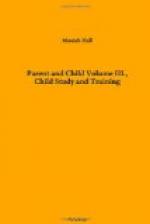As already stated, the primary instincts of the child favor the development of selfishness and the gratification of the appetites and passions. The utmost care, therefore, must be exercised by the parents, from the very beginning, if the affections and desires of the child are to be trained away from itself and not permitted to become self-centered. Happy is the child whose mother knows how to direct those earliest manifestations of love. The undisciplined senses and appetites easily degenerate into indulgence of passion, or grow into that moral control which delights in temperance.
The inborn desire for praise and recognition may express itself in bragging vanity, or expand into heroic endeavor. So, too, there is a physical love which expresses itself in a mere caress and a higher, purer, more glorious love which manifests itself in service and self-sacrifice. The tremendous hug of the little arms and the kiss of the rosy lips are manifestations of physical love; while the child is in this loving mood the wise mother should ask of him some little service, slight at first, but sufficient to make him put forth some effort to serve her. In this way she can transform this mere selfish love into the beginning of that spiritual love which Christ commended when He said, “If ye love me, keep my commandments.”
The parent stands to his child for the time being, as the one supreme source of every power and blessing; the wise parent may establish between himself and the little one almost the same beautiful and solemn relationship as that which exists between the Supreme Giver of all good and His children. “Not every one that sayeth unto me, ‘Lord, Lord,’ shall enter into the Kingdom of Heaven, but he that doeth the will of my Father which is in Heaven.”
“Love is to be tested always by its effect upon the will. From the beginning the will must be made strong and unselfish by repeated acts of loving self-sacrifice. Contrast the selfish, all-absorbing love of Romeo for Juliet, who could not live without the physical presence of the one he loved, with that grandly beautiful love of Hector for Andromache, who, out of the very love he bore her, could place her to one side and answer the stern call of duty that she might never in the future have cause for painful blush.
“I knew an ideal home where husband and wife were filled with the most exalted love I have ever known, but the husband died. The wife said: ’All that was beautiful or attractive in my life went out with my husband, and yet I know that I must, for the love I bear him, remain and rear our child as he would have him reared.’ As I listened to these words, quietly uttered by the courageous wife, I realized what love, real love, could help the poor, stricken heart to endure.”
The child must be trained through love to give up his own will to others, and, from the beginning, learn to submit to things which are unpleasant.
If this thought is insisted on from the first, obedience will come easily to the child; but woe be to both mother and child if egotism, self-will and selfishness secure a fast hold upon the young heart.




